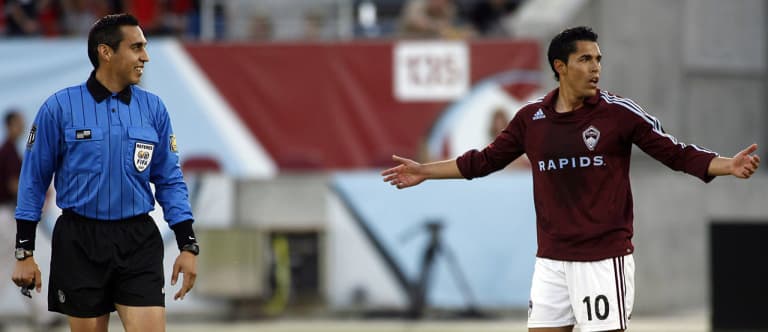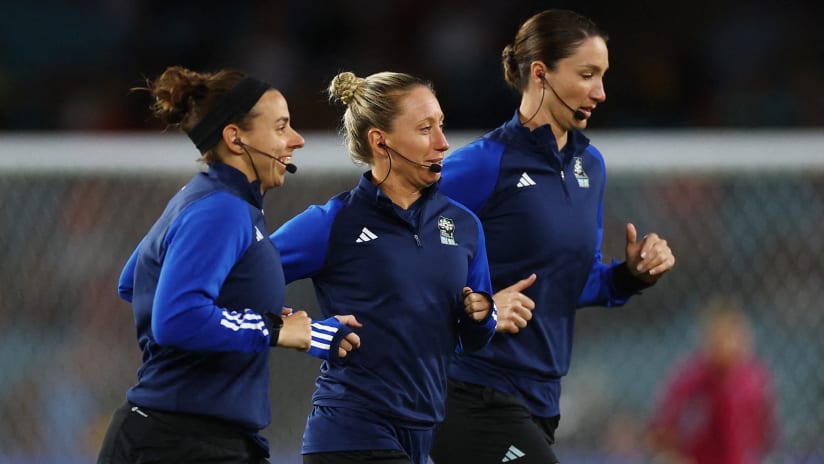As most readers know all too well by now, neither the United States nor Canada made it to the 2018 World Cup. But another North American team did.
Five officials from the Professional Referee Organization, the body that supplies refs to MLS, USL, NWSL and other US and Canadian competitions, will take part in this summer’s tournament in Russia, a delegation led by American referees Jair Marrufo and Mark Geiger.
Marrufo will be serving as the center referee on Saturday for the Belgium-Tunisia match, having already served on the Video Review crew in Russia.
Selection to his first FIFA World Cup is a crowning achievement of Marrufo’s career, one of the longest in modern North American refereeing and one that’s spanned most of MLS’s existence. Here are 10 things to learn about Marrufo as he prepares to step into the global spotlight:
1. A proud El Pasoan
Marrufo was born and raised in El Paso, the desert city where West Texas and the northern Mexican state of Chihuahua meet on the Rio Grande, and reflects the border region’s history and heritage.
The son of Mexican immigrants, Marrufo speaks both English and Spanish and is also a second-generation referee. His father Antonio refereed nearly 400 matches in the Mexican Primera Division, the forerunner to Liga MX. Though he travels constantly because of his job, Jair still remains based in El Paso today.
2. Fulfilling the dreams of his father
Antonio nearly got his chance to ref in a World Cup, but never made the final list. So his son’s call to Russia is an enormous joy for both of them, one that Jair is doing his best to share every moment of, starting with the emotional phone call in which he relayed the good news.
“I could hear in his voice the tears, the excitement, just being so proud and I started tearing up as well, just because I knew that he wanted to referee at a World Cup,” Marrufo recalled in a recent conversation with MLSsoccer.com. “It didn’t happen for him, but now it’s happening for me and I’m just happy to give him that, and that he could see that and live his dream through me.
“He’s just ecstatic about me participating and just going through all this. I just keep filling him up day by day with what’s going on,” he added, “so he could live it through me.”
3. A center back in his playing days
The elder Marrufo guided Jair towards refereeing when he was still a teenager, making the case that it offered a better shot at a high-level soccer career than as a player. A central defender, Jair was not enthused by the idea at first, but it turns out his dad was right.
His Mexican roots aside, Jair says his favorite team growing up was the US men’s national team, another thing he credits to his father’s advice.
“Since day one, my father told me, ‘root for the US, they’re going to be big.’ And since day one, I’m a US fan,” said Marrufo.
“I was really focused on what I was doing with FIFA and trying to get myself, also, to the World Cup,” he said of the national team’s qualifying woes. “Things happen and it’s unfortunate, but we’re happy that we could participate, our program, as four [US] referees going into the World Cup.”
4. One of the first full-time referees in US and Canadian soccer history
Until 2007, even the top referees in the two countries were moonlighters who officiated in addition to full-time jobs in other sectors. That year the U.S. Soccer Federation began a program to make leading refs full-time professionals, and Marrufo was a member of the first group to do so, along with colleagues Terry Vaughn, Baldomero Toledo and Ricardo Salazar.
Before that? He worked as a substitute teacher, and also for Sherwin-Williams paint company.
5. Has spent half his life as an MLS referee

Marrufo has had a long tenture in MLS. Here he is in 2007, officiating a game that included then-future US national team World Cup player Herculez Gomez. | USA Today Sports Images
The Texan officiated his first MLS match at the turn of the century, a match between Colorado vs. New England on May 10, 2000, at the tender age of 22. Like many longtime observers of the league, he’s been amazed by the league’s growth and maturation since then. He cites one game he oversaw in 2007 as one of the major memories of his career to date: David Beckham’s MLS debut in an LA Galaxy vs. D.C. United match at RFK Stadium.
“It’s nice to see the crowds getting into it in a sold-out stadium,” he said. “Every year it keeps growing and growing. Atmospheres like Atlanta, [places] where you’ve seen sellout after sellout, it’s just nice to see, coming from 18 years ago when it was just starting.
“Those kind of moments that you notice that have a huge impact on the league’s growth – it’s nice to be a part of that.”
6. A big fan of the beautiful game, but through a different lens
“I’m a fan of watching good soccer and watching games from all over the world,” said Marrufo. “But as a referee you tend to watch the game a little bit differently than a regular fan. I just look at the referee’s position, where he’s at, if he’s in a good position or not – I’m not actually looking at where the players are, I’m actually just looking at the referee when I watch the game.
“You’re just wired to it. That’s all I know and pretty much that’s how I watch the game now.”
7. One of many refs intensely preparing for Russia for months
Just as it represents the pinnacle of ambition and achievement for players, the World Cup is also the biggest honor and opportunity for referees – one that demands meticulous mental and physical preparation.
“It’s been a long process, a lot of seminars all over the world,” explained Marrufo, whose recent FIFA schedule has taken him to Dubai, Abu Dhabi, Doha and Florence, among other locales. He and his fellow refs gathered in Moscow starting June 2 for a two-week training camp before the tournament starts. And like players, referees do their utmost to make sure they’re fully fit and healthy at this stage; Marrufo has undergone extra massage therapy sessions and an extra-disciplined diet in recent weeks. He believes that the MLS calendar will help keep him sharp, as he worked league matches right up until his departure, compared to counterparts whose domestic competitions ended weeks ago.
8. Spends 2 hours a day on fitness
All PRO referees have to undergo daily strength and conditioning workouts – nearly as much as players.
“On a daily basis our sports scientist Matt Hawkey sends our workout,” said Marrufo, who spends about an hour a day doing run workouts on the track and an hour a day in the gym as well as pool work and other recovery practices. And thanks to modern technology, there’s no dodging the grind.
“We have heart-rate monitors by Polar and a GPS system that we use as well, so they know what we’re doing and if we’re doing it well … We can’t just say we’ll ‘do it later’ or ‘do it tomorrow.’ We have to do our workouts because they’re monitoring us.”
9. Will be heavily involved in VAR at the World Cup
For the first time, video review will feature at this World Cup, putting MLS referees ahead of the curve thanks to the league’s adoption of the technology last year.
“We have a great advantage,” said Marrufo, who will be eligible for selection as a VAR or assistant VAR ref in addition to possible assignments in the middle of the pitch. “It helped giving our experience and helping others trying to catch up in the few months to get ready for the World Cup. It was nice to see they’re embracing as much as we are.”
He says FIFA’s VAR setup will be similar to MLS’s, albeit with extra involvement for assistant referees, particularly on offside calls, “to have more eyes on the monitor.”
10. Hopes not to return from Russia until mid-July
Referees are evaluated closely on their performances during the tournament, and only the best are kept around to oversee the huge matches late in the knockout stages.
“It’s open-ended,” he explained, “depending on how you perform – like any team, if you perform well you continue, you stay until the end.
“I think the worst nightmare for a referee is missing something that’s so obvious that everybody saw except you … We all mistakes, but you don’t want to make it on the biggest stage in the world,” Marrufo added. “If something goes wrong, that could be your last game. So that’s why you try to be focused and give it your all, so you can have the opportunity to have another game.”












